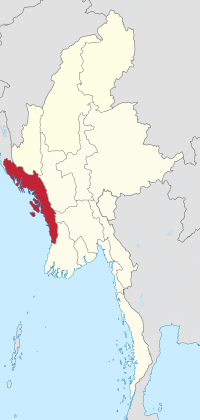International reactions to the 2016–17 Rohingya persecution in Myanmar
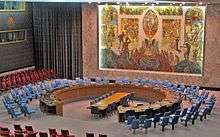
Since October 2016, thousands of Rohingya refugees have fled Myanmar due to persecution in Rakhine State. The exodus has become a humanitarian crisis. The persecution was preceded by crackdowns in 1978, 1991–1992,[1] 2012 and 2015. The United Nations believes that Myanmar wants to expel its entire Rohingya population.[2]
The events have been termed a genocide by international observers. [3]
On 25 August 2017, the Tatmadaw (the Myanmar armed forces) launched a military operation against the Rohingya civilian population in response to attacks by Rohingya militants on 30 police posts and an army base. The Myanmar military—with help from mobs of local Rakhine people—is alleged to have burned Rohingya villages,[4][5] carried out summary executions and beheadings of Rohingyas (including children),[6] raped Rohingya women;[7] and planted landmines.[8] Between 400 and 3,000 people were killed between 25 August and 11 September 2017.[9][10] On 22 September 2017, satellite images indicated that Rohingya villages were still being burned. An estimated 655,500 refugees had fled into Bangladesh since 25 August 2017[11] (a larger weekly outflow of refugees than during the Rwandan genocide),[1] out of a pre-violence Rohingya population of about one million in Rakhine State.[1] In December 2017, Doctors without Borders estimated a death toll of 10,000 people in Rakhine State due to Myanmar's military operations.[12] Mass graves have been discovered in several parts of Rakhine State.[13] Evidence of atrocities emerged with reports of the Gu Dar Pyin massacre and Tula Toli massacre. Footage obtained by Reuters showed the summary execution of 10 Rohingya men.[14] Two Myanma journalists who obtained the information for Reuters have since been arrested.[15] Amnesty International has described Rakhine State as a "crime scene".[16] There have been calls for the prosecution of members of Myanmar's military.
Despite centuries of settlement in the Arakan region (now Rakhine State), the Rohingya population are denied citizenship and other basic rights under several controversial Myanmar laws (particularly the 1982 Myanmar nationality law). Myanmar has been accused of genocide and ethnic cleansing of the Rohingya.[17][18]
International reaction has focused on pressuring Aung San Suu Kyi to condemn the atrocities and address human-rights issues. Suu Kyi's power is restricted under the 2008 Constitution of Myanmar, which places key ministries like home, border affairs and defense under military control and reserves 25 percent of seats in the Myanmar parliament for serving military officers. Military chief Min Aung Hlaing is regarded as the most powerful person in the country.[19]
The persecutions of ethnic Rohingyas in Myanmar continued up to 2018, and is viewed to continue until a lasting resolution is made between the Government of Myanmar (which has internal political disputes on the matter), the Government of Bangladesh, representatives from the Rohingya people, and states in the ASEAN (Association of Southeast Asian Nations).
Countries
Afghanistan
The Afghan foreign ministry said in a written statement, "The Ministry of Foreign Affairs of the Islamic Republic of Afghanistan condemns in the strongest terms the devastating cruelty and murder of innocent Rohingya Muslims by Myanmar’s security forces. While vehemently condemning these vicious and inhuman attacks by the government forces against its Muslim population, the Ministry of Foreign Affairs calls on the United Nations and other International Human Rights Organizations to examine the genocide and massacre of innocent Muslim community in this country".[20]
Algeria
The Algerian foreign ministry expressed "great concern" about the persecution. According to a spokesman, "The tragedies that occur behind closed doors in Burma where Burmese Muslim citizens are the victims, reached unspeakable heights in horror, according to information reported by many media and diplomatic sources".[21]
Australia
In the spring of 2017 the Australian Senate passed a motion urging the government to call on the United Nations for a commission of inquiry.[22] In early September 2017, as the Rohingya crisis became ethnic cleansing, Foreign Minister Julie Bishop said that Australia was deeply concerned by the escalating violence in Myanmar's Rakhine State and would provide up to A$5 million to help Rohingya refugees in Bangladesh.[23][24]
Australia had long interned some of its own Rohingya refugees in camps on Manus Island in Papua New Guinea (whose government ruled the camps unlawful in 2016). PNG and Australia committed to closing the Manus Island camps by October 31, 2017. By mid-September 2017, Australia committed A$70 million more towards the Rohingya refugee crisis.[25][26][27]
Austria
The Austrian embassy in Myanmar demanded humanitarian access to affected areas in Rakhine State.[28]
Azerbaijan
The government of Azerbaijan pledged to send material relief for Rohingya refugees and condemned the violence against civilians, saying that it supported Organization of Islamic Cooperation efforts to address the situation.[29]
Bangladesh
.jpg)
Since 25 August 2017, Bangladesh has received at least 655,500 refugees.[11] As of 11 January 2018, 971,627 refugees were registered in Bangladesh.[11] The Parliament of Bangladesh adopted a unanimous resolution urging the international community to pressure Myanmar to provide citizenship and safe return for the Rohingya.[30] The President of Bangladesh Abdul Hamid suggested that a United Nations-administered humanitarian corridor be established in Myanmar for the Rohingya.[31] Prime Minister Sheikh Hasina said, "They (Myanmar) should stop the violence. The Myanmar government should have handled this situation patiently and not allowed the army to attack the common people. What are the crimes of the women, children, the innocent people? They are not responsible".[32] Foreign Minister Abul Hassan Mahmud Ali said that Myanmar's actions were being described as genocide.[33] National Human Rights Commission of Bangladesh chairman Kazi Reazul Hoque alluded to the prospect of international prosecution of Myanmar forces: "The way the genocide has been carried out in Myanmar, the way the people were killed in arson attacks, we are thinking about pressing for a trial against Myanmar, and against the Myanmar army at an international tribunal".[34] The Bangladeshi foreign ministry summoned the Myanmar envoy several times since the crisis began, protesting the refugee influx and alleged intrusions by Myanmar aircraft into Bangladeshi airspace.[35] Major General Abul Hussain, a border force commander, promised a "befitting reply" to any "untoward situation" on the Bangladesh-Myanmar border.[36]
Muhammad Yunus, recipient of the 2006 Nobel Peace Prize, made a seven-point proposal which included implementation of the Kofi Annan Commission report and UN-administered camps in Myanmar.[37] In a rare moment of political unity, the BNP (Bangladesh's largest opposition party) supported Prime Minister Hasina's visit to refugee camps.[38] Another opposition party, the Jatiya Party, demanded sanctions against Myanmar.[39] The Bangladesh Armed Forces were reportedly placed on high alert.[40] According to a Bangladeshi official, the government was focused on finding a peaceful resolution of the crisis and stated that "our goal is to ensure a stable, peaceful and safe environment in the Rakhine State so that people of all religion, color and community can live there in harmony, and we are holding discussions at various places to this end".[41]
On 21 September 2017 Prime Minister Hasina addressed the United Nations General Assembly. She criticized Myanmar for ethnic cleansing, demanded implementation of the Kofi Annan Commission report and proposed a five-point plan for restoring stability in Rakhine State which included UN-monitored "safe zones".[42][43]
On 29 September Masud Bin Momen, Permanent Representative of Bangladesh to the UN in New York, informed the Security Council that Myanmar intended to depopulate Rohingya lands by burning villages and was using rape as a weapon. According to Bin Momen, Myanmar had deployed two army divisions with heavy artillery near the border with Bangladesh since the first week of August. Bin Momen also reported of 19 violations by Myanmar military helicopters of Bangladeshi airspace, and repeated the Bangladeshi government's demand for the establishment of UN-supervised safe zones in Rakhine State.[44][45]
Belgium
According to the Belgian foreign ministry, Deputy Prime Minister and Foreign Minister Didier Reynders said: "The first urgency is for tensions in Rakhine State to abate and to allow unlimited access for humanitarian aid. But it is also important to be able to take long-term measures in order to guarantee decent living conditions to the Rohingya population within the framework of the Burmese nation. Only these will make peaceful coexistence among different ethnicities in this State of Myanmar possible".[46] The Belgian embassy in Myanmar demanded access for international NGOs to Rakhine State.[28]
Brazil
Brazil has strongly supported resolutions adopted by bodies in the United Nations to find a permanent solution for the Rohingya.[47]
Canada
.jpg)
Prime Minister Justin Trudeau discussed the situation during a telephone call to State Counsellor Aung San Suu Kyi,[48] and the Canadian government pledged CA$1 million for relief support of Rohingya refugees.[49] Foreign Minister Chrystia Freeland said the violence against the Rohingya "looks a lot like ethnic cleansing". According to the parliamentary secretary of the Canadian foreign ministry, "The violence is still ongoing so obviously there's a failure on part of the military, on the part of the government. I don't think we heard the end of this yet about what our role is going to be. As I said, we are still assessing the situation and we're looking for ways for Canada to be constructive. We are in discussion as well with our embassy over there, with our officials on the ground". The Canadian government has faced internal pressure to act, and pro-Rohingya protests in Toronto included Buddhist members of the Toronto city council.[50]
On 21 September 2018, lawmakers from the House of Commons unanimously adopted a motion to recognize the Rohingya crisis as a genocide, describing it as 'crimes against humanity'. The House of Commons also endorsed the report from the UN High Commissioner for Refugees fact-finding mission in Myanmar.[51][51]
China
China has supported Myanmar in the UN Security Council.[52] Chinese President Xi Jinping met Myanmar's military chief Senior General Min Aung Hlaing in November 2017.[53] The general is widely considered as one of the masterminds behind the alleged ethnic cleansing campaign. The Chinese foreign ministry said "We condemn the violent attacks which happened in Rakhine state in Myanmar ... We support Myanmar's efforts in upholding peace and stability in the Rakhine state. We hope order and the normal life there will be recovered as soon as possible. We think the international community should support the efforts of Myanmar in safeguarding the stability of its national development".[54]
Although China has traditionally supported Myanmar, the country's foreign minister Wang Yi expressed willingness to help Bangladesh and Myanmar find a solution to the crisis.[55] The Chinese foreign minister visited Bangladesh and Myanmar and outlined a three-stage proposal for the return of refugees.[56]
There have been protests in the Hong Kong Special Administrative Region in support of the Rohingya.[57]
Denmark
Danish Minister for Development Cooperation Ulla Tornaes said, "Denmark stands ready with immediate financial support when our international humanitarian partners can provide assistance to all indigent people in Rakhine."[58]
Egypt
The Egyptian foreign ministry condemned the massacre and displacement of the Rohingya and called for a permanent solution to the conflict.[59]
France
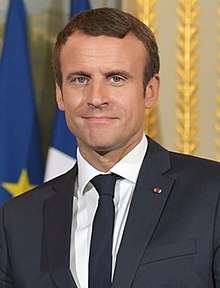
French President Emanuel Macron described the situation as "genocide" and "ethnic purification", and alluded to the prospect of UN-led intervention.[60] In a statement, the French foreign ministry said: "As we recently indicated, France is concerned by the deteriorating security and humanitarian situation in Rakhine State. It calls for the cessation of violence against the civilian populations who have been forced to flee in huge numbers and demands that the Burmese security forces ensure their protection and guarantee the restoration of safe humanitarian access. We reaffirm our support for the work of the humanitarian organizations on the ground. They provide aid and protection to all civilian populations. We are helping the French NGOs in order to respond to the needs of the affected populations as well as the internally displaced persons in Rakhine State; this is in addition to France’s voluntary contribution to the Office of the United Nations High Commissioner for Refugees (UNHCR). France calls on Bangladesh to continue to accept the Rohingya who are seeking refuge within its borders. A political solution must be found in order to put an end to this cycle of violence. In this respect, we reaffirm our support for the Burmese government in implementing the recommendations of the Advisory Commission on Rakhine State chaired by Kofi Annan".[61]
President Macron discussed the Rohingya crisis with Bangladeshi Nobel laureate Muhammad Yunus. He also met with Bangladeshi Prime Minister Sheikh Hasina and pledged continued support for achieving a permanent solution to the conflict.[62][63]
Germany
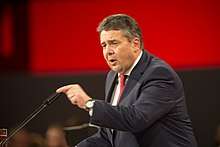
German Foreign Minister Sigmar Gabriel expressed grave concern with the situation in Rakhine State, calling on State Counsellor Aung San Suu Kyi to do more to end the conflict. Germany supported the implementation of the proposals made by the Kofi Annan Commission, and noted that it was a huge burden on Bangladesh to host the large refugee population.[64]
The German foreign minister visited Rohingya refugee camps in Bangladesh.[65]
Greece
The Greek embassy in Myanmar demanded humanitarian access for aid groups in Rakhine State.[28]
Holy See

Pope Francis said, "Sad news has reached us of the persecution of our Rohingya brothers and sisters, a religious minority. I would like to express my full closeness to them – and let all of us ask the Lord to save them, and to raise up men and women of good will to help them, who shall give them their full rights".[66]
After meeting Rohingya refugees in Dhaka, Bangladesh, the Pope said "the presence of God today is also called Rohingya".[67]
India
The Government of India led by Prime Minister Narendra Modi has been largely silent on the atrocities faced by the Rohingya people in Myanmar.[68] Modi, whose party the BJP is accused of promoting Islamophobia and violence against Muslims in India,[69] traveled to Myanmar on 5–6 September 2017 and stated "we hope that all stakeholders together can find a way out in which unity and territorial integrity of Myanmar is respected".[70] He did not use the term "Rohingya" and condemned attacks by Rohingya militants. During his visit, he reportedly advised State Counsellor Aung San Suu Kyi that she had "a very good international image" which she should not tarnish.[71]
India also announced plans to deport its Rohingya refugee population. Minister of State for Home Affairs Kiren Rijiju described the refugees as "illegal immigrants", echoing the Myanmar government position.[72][73] Although the Rohingya have fought deportation in the Indian courts (partly on humanitarian grounds), in September 2017 the Indian government responded that India did not sign the 1951 Refugee Convention and most Rohingya arrived in India before the August 2017 violence. Some Indian media have reported that the country's intelligence agencies suspect militant Royhinga leaders of conspiring with Pakistani terrorists and planning to incite violence in India.[74]
Varun Gandhi, a leader in Modi's own ruling party and a grandson of Indira Gandhi, opposed the government's plan to expel 40,000 Royhinga refugees and called for their asylum after careful vetting. Gandhi said that India is a party to the SAARC Terrorism Protocol, whose Article 17 forbids India from deporting anyone on religious grounds.[74][75] Minister of State for Home Hansraj Ahir dismissed Gandhi's view as "against national interest".[74] The Chief Minister of West Bengal Mamata Banerjee called for support of Rohingya refugees, whom she described as "common people" who should not be seen as a security threat to India.[76] Shashi Tharoor, a leader of the main opposition Indian National Congress party, criticized the Modi government for not having a "mechanism" to process asylum applications.[77]
India later updated its response to the crisis. After Modi returned to India from Myanmar, the High Commissioner of Bangladesh met with the Foreign Secretary of India.[78] Following the meeting, the Indian foreign ministry issued a statement: "We would urge that the situation in Rakhine be handled with restraint and maturity, focusing on the welfare of the civilian population alongside those of the security forces".[79][80] The Indian Air Force began Operation Insaniyat to deliver aid for Rohingya refugees in Bangladesh.[81]
In October 2017, External Affairs Minister Sushma Swaraj expressed India's support for a permanent solution to the crisis urged the international community to contribute to the social and economic development of Rakhine State. According to Swaraj, the Myanmar government should repatriate the refugees (who are Burmese nationals) and "punish the terrorists, not innocent people."[71]
On the sidelines of CHOGM 2018, the Indian prime minister contradicted his own earlier position in a Commonwealth joint communique which supported the Rohingya's right of return to Myanmar. Speaking at a political rally of Non-Resident Indians titled "Bharat ki Baat, Saab ki Saath", Modi said "When the Rohingya people returned to Bangladesh, we understood that Bangladesh is our friend. So we started sending steamers full of aid there". The comment reportedly embarrassed Indian diplomats. An anonymous source in the Indian foreign ministry reportedly said "Prime Minister Narendra Modi may have suffered a slip of tongue. He could have meant that Rohingyas fled to Bangladesh, instead of saying the Rohingyas returned. But this is just conjecture". The Indian foreign ministry refused to publicly comment on Modi's remarks.[82]
Indonesia
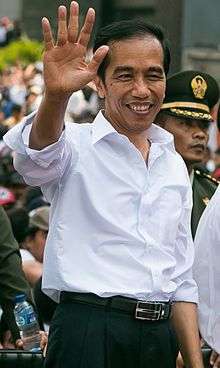
President of Indonesia Joko Widodo condemned the violence against the Rohingya and oversaw the departure of four Indonesian Air Force transport planes with 34 tons of relief supplies for Rohingya refugees in Bangladesh.[83][84] Foreign Minister Retno Marsudi visited Myanmar and Bangladesh on 3–4 September 2017 to discuss the situation with State Counsellor Aung San Suu Kyi and Prime Minister Sheikh Hasina.[85]
In January 2018, President Widodo visited Rohingya refugee camps in Cox's Bazaar while visiting Bangladesh.[86]
Iran
Supreme Leader of Iran Ali Khamenei called Aung Sang Suu Kyi a "brutal woman",[87] and Iranian Foreign Minister Javad Zarif condemned Myanmar on behalf of the Iranian government. Zarif urged the international community to take action before it was too late.[88]
Iraq
Iraq's Foreign Ministry released a statement: "The Iraqi Foreign Ministry expresses its firm rejection and condemnation of the crimes and atrocities committed by the government authorities in Myanmar against the safe minority of the Rohingya Muslims in Arakan province west of the country, And calls upon the United Nations, all organizations of international community and all Islamic and Arab countries to take all deterrent measures to stop these brutal massacres, which are less common in the world, in addition to serious work to open the way for the arrival of teams and humanitarian aid to the people of Rohingya immediately".[89]
Ireland
The Irish embassy in Myanmar demanded the resumption of humanitarian work by international NGOs in Rakhine State.[28]
Israel
The Israeli government froze military sales to Myanmar as a result of the crisis. A statement from the Israeli foreign ministry stated that "The State of Israel’s oversight policy for defense exports are reviewed regularly in accordance with different considerations, including the human rights situation in the country, as well as the policy of the UN Security Council and other international bodies".[90]
Italy
The Italian government expressed grave concern and pledged 7 million euros for Rohingya refugees.[91]
Japan
On 26 September 2017, the government of Japan extended a US$4 million emergency grant to aid Rohingya refugees in Myanmar and Bangladesh.[92] Three days later, the Japanese government issued a statement: "Japan strongly condemns the attacks carried out against the Myanmar security forces in northern areas of Rakhine State in Myanmar since 25 August as utterly unacceptable and expresses its condolences to the bereaved families. Japan strongly expects that, with the restoration of security, the protection of civilian populations and humanitarian access is assured as soon as possible. Japan will support the efforts by the Myanmar government to implement the recommendations for realizing peace and stability in Rakhine State presented in the Final Report of the Advisory Commission on Rakhine State led by Former United Nations Secretary General Dr. Kofi Annan".[93]
Japanese foreign minister Taro Kono visited Rohingya refugee camps in Bangladesh and Rohingya villages in Myanmar.[94][95]
Jordan

The Hashemite Kingdom of Jordan described the tragedy faced by the Rohingya as "unforgivable". The kingdom dispatched several batches of aid for refugees.[96]
Queen Rania visited Rohingya refugee camps in Cox's Bazaar, Bangladesh.[97]
South Korea
The Republic of Korea pledged at least US$3.4 million in aid for Rohingya refugees through UN agencies.[98]
Kuwait
The Kuwaiti government announced US$1.5 million in aid for Rohingya refugees.[99]
Latvia
Latvia expressed its support for a UN Commission of Inquiry concerning the situation in Rakhine State, Myanmar.[100]
Malaysia

Malaysian Prime Minister Najib Razak described the Rohingya persecution as genocide and dispatched two Royal Malaysian Air Force planes with relief supplies for Rohingya refugees in Bangladesh.[101][102] Malaysian Defense Minister Hishamuddin Hussein warned that terror groups might gain a foothold in Myanmar if the crisis was not addressed.[103] However, during the 2017 ASEAN General-Assembly, Malaysia insisted on rejecting an ASEAN statement condemning attacks on Myanmar security forces and all acts of violence which result in the loss of civilian lives, destruction of homes and the displacement of large numbers of people. The rejection of the statement solidified ASEAN's stance for accepting human rights violations against Muslim Rohingyas, though Indonesia and Brunei were against the rejection.[104]
Maldives
The Maldivian government said in a statement, "The Maldives condemns in the strongest terms, the atrocities committed against the Rohingya Muslim community in Myanmar, and is deeply concerned by the recent cycle of violence that resulted the death of dozens of Rohingya Muslims and displacing several thousands.The Rohingya Muslim minority continues to suffer under systematic repression and the United Nations has in the past documented such human rights violations against this minority group in Myanmar. The Maldives believes that the international community must act swiftly and firmly to stop the bloodshed. The Government of Maldives has decided to cease all trade ties with Myanmar, until the Government of Myanmar takes measures to prevent the atrocities being committed against Rohingya Muslims. The Government of Maldives requests the United Nations Secretary General and the United Nations Human Rights Council to look into the grave violations of human rights against the Rohingya Muslims in Myanmar".[105]
Mexico
The Mexican government said in a statement, "On behalf of the government of Mexico, the Foreign Ministry expresses its deep concern about the recent escalation of violence against the Rohingya Muslim minority in Rakhine state in northern Myanmar. Mexico reiterates its repudiation of all forms of violence, its unconditional support for the peaceful settlement of disputes and its commitment to protecting and defending human rights. It also calls on the parties involved to exercise maximum restraint, protect the civilian population and guarantee access to humanitarian aid for those who need it most. In addition, Mexico expresses its solidarity with the authorities in Bangladesh, a country that has welcomed thousands of refugees as a result of the crisis in Rakhine.".[106]
Myanmar
Denying that its forces committed atrocities, Myanmar has blamed "terrorists" for all violence (including the burning of villages). According to State Counsellor Aung San Suu Kyi, there was misinformation about the situation.[107][108]
Morocco
The Kingdom of Morocco was one of the first countries to send aid shipments for Rohingya refugees in Bangladesh.[109]
Netherlands
The Dutch government promised relief supplies and emergency financial support for the Rohingya refugees.[110]
Nigeria
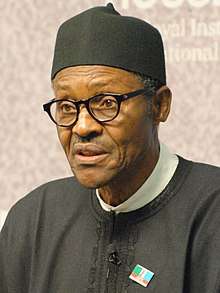
Nigerian President Muhammad Buhari described Myanmar's actions as ethnic cleansing and warned of a disaster comparable to the Bosnian and Rwandan genocides.[111] The Nigerian government urged an end to ethnic cleansing in Myanmar.[112]
Norway
The Norwegian government increased its humanitarian support of Myanmar and Bangladesh.[113]
Pakistan
Pakistani Foreign Minister Khawaja Asif expressed anguish at the "violence against the Rohingya Muslims in Myanmar", calling it "a challenge to the conscience of the international community".[114] At a meeting chaired by Prime Minister Shahid Khaqan Abbasi, the cabinet adopted a resolution: "We call upon Nobel laureate Ms Aung San Suu Kyi to take immediate steps to stop the atrocities being committed in Myanmar where her party is in power. We also call upon the United Nations to take the lead, which it must under its mandate, in stopping immediately the genocide of Rohingya Muslims by Myanmar".[115] On 9 September, Foreign Secretary Tehmina Janjua summoned the Myanmar ambassador in Islamabad to register a formal protest.[116] Thousands of Pakistanis demonstrated in major cities across the country, protesting against the crackdown on Rohingya Muslims.[117][118]
Palestine
Palestinian President Mahmoud Abbas described the Rohingya exodus to Bangladesh as "a disaster".[119]
Philippines
In 2016, during the last months in office of President Noynoy Aquino, son of the Mother of Asian Democracy, Corazon Aquino, the Philippines government expressed their wish to provide shelter for up to 3,000 "boat people" from Myanmar and Bangladesh. As a signatory to the 1951 Convention relating to the Status of Refugees, the country abides by the rules of international law and will provide assistance to refugees.[120] Malacañang Palace also noted in a statement that this follows the country's harbouring and assistance to Vietnamese boat people fleeing from Vietnam in the late 1970s.[121]
In 2017, ASEAN chair and newly elected Philippines President Rodrigo Duterte accepted Malaysia's rejection of an ASEAN statement condemning attacks on Myanmar security forces and all acts of violence which result in the loss of civilian lives, destruction of homes and the displacement of large numbers of people. The rejection of the statement solidified ASEAN's stance under Duterte for accepting human rights violations against Muslim Rohingyas, though Indonesia and Brunei were against the rejection.[104]
In January 2018, Rodrigo Duterte revealed that he advised Myanmar's Suu Kyi to 'ignore human rights criticisms on Rohingya issue'.[122]
In April 5, 2018, Rodrigo Duterte recognized the existence of a genocide against the Rohingya people. He told media that the Philippines is willing to shelter some Rohingya refugees, if Europe will also shelter some as well.[123]
Poland
The Polish embassy in Myanmar demanded humanitarian access to violence-affected areas of Rakhine State.[28]
Portugal
The foreign ministry released a statement: "The Portuguese government calls for an immediate end to the violence and hopes Myanmar authorities can quickly guarantee conditions for reestablishing humanitarian access and, at the same time, ensuring the protection of the innocent civil population".[124]
Russia
The Russian government condemned the Rohingya militant raids, "strongly condemn[ing] this armed raid aimed at undermining the efforts of Myanmar’s authorities and the international community to stabilise the situation in Rakhine State".[125] President of Chechnya Ramzan Kadyrov led a rally of several thousand people in the Chechen capital, Grozny, in protest of Myanmar's discrimination against the Rohingya, and Kadyrov disavowed the Russian government position.[126]
Russian President Vladimir Putin condemned “violence against Muslims” in Myanmar.[127]
Saudi Arabia
According to the Saudi ambassador to the United Nations, "The Kingdom of Saudi Arabia has reached out to members of the Security Council to address the recent human rights violations against the Rohingya on its agenda. The Kingdom of Saudi Arabia has expressed its concern to the Secretary General".[128] King Salman pledged US$15 million for Rohingya refugees in Bangladesh.[129]
Singapore
The Singaporean foreign ministry urged calm and restraint by all sides in Rakhine State,[130] pledging support for efforts by ASEAN to utilise existing mechanisms to provide humanitarian assistance to the affected people in Rakhine State in accordance with the principles of the ASEAN Charter.[131] Singaporean Secretary for Home Affairs Amrin Amin announced on 19 October 2017 that his country would pledge S$100,000 through the ASEAN Humanitarian Assistance (AHA) centre to aid humanitarian efforts in Rakhine State.[132]
Spain
The Spanish Embassy in Myanmar demanded humanitarian access for aid groups in Rakhine State.[28]
South Africa
The South African government expressed concern over the violence in Rakhine State.[133]
Sweden
Sweden demanded international humanitarian access to Rakhine State,[28] and requested a closed-door meeting of the United Nations Security Council to discuss the "deteriorating situation" on 12 September 2017.[134]
Swedish foreign minister Margot Wallström visited Rohingya refugee camps in Bangladesh.[65]
Switzerland
Switzerland announced financial aid worth more than CHF 12 million for Rohingya refugees.[135] President of the Swiss Confederation Alain Berset visited Rohingya refugee camps in Cox's Bazaar, Bangladesh.[136]
Turkey
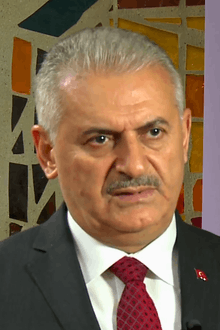
Turkish President Recep Tayyip Erdogan described the Rohingya persecution as genocide.[134] First Lady Emine Erdogan and Foreign Minister Mevlüt Çavuşoğlu flew to Bangladesh to visit Rohingya refugee camps, and Turkey pledged 1,000 tons of relief supplies.[137][138]
Turkish Prime Minister Binali Yildirim accused Myanmar of genocide while visiting Rohingya refugee camps in Cox's Bazaar, Bangladesh.[139]
Ukraine
At the United Nations, Ukraine's ambassador underscored that targeting of civilians and infringing upon their human rights are unacceptable and stressed that these actions can not be tolerated. Ukraine's ambassador emphasized that "Ukraine is seriously concerned by the continuously worsening humanitarian situation of hundreds of thousands of refugees and IDPs and stresses the need to ensure unhindered access of humanitarian actors to those in need."[140]
United Arab Emirates
The UAE government provided aid shipments to the United Nations High Commissioner for Refugees for the Rohingya people.[141]
United Kingdom
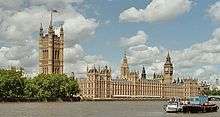
By 13 September 2017, the United Kingdom had asked the United Nations Security Council to discuss the Rohingya crisis twice: on 29 August and 13 September.[142][143] British Foreign Secretary Boris Johnson said in a statement,
Aung Sang Suu Kyi is rightly regarded as one of the most inspiring figures of our age but the treatment of the Rohingya is alas besmirching the reputation of Burma. She faces huge challenges in modernising her country. I hope she can now use all her remarkable qualities to unite her country, to stop the violence and to end the prejudice that afflicts both Muslims and other communities in Rakhine. It is vital that she receives the support of the Burmese military, and that her attempts at peacemaking are not frustrated. She and all in Burma will have our full support in this".[144]
A statement by 157 members of Parliament read, "The scale of the human rights and humanitarian crisis unfolding in Myanmar is unprecedented in its recent history. It requires the attention of the British government at the highest level".[145]
While visiting Bangladesh, Foreign Secretary Boris Johnson said "The plight of the Rohingya and the suffering they have had to endure is one of the most shocking humanitarian disasters of our time. This is a man-made tragedy that could be resolved with the right political will, tolerance and cooperation from all those involved".[146] Johnson compared the Rohingya situation with the displacement of Palestinians in 1948.[147] He visited Rohingya refugee camps in Cox's Bazaar, Bangladesh.[148]
United States
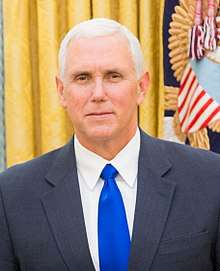
On behalf of President Donald Trump, Vice President Mike Pence condemned the "terrible savagery" against the Rohingya: "The images of the violence and its victims have shocked the American people, and decent people all over the world". Pence called the Rohingya expulsion a "historic exodus" and a "great tragedy unfolding", saying that the situation may "sow seeds of hatred and chaos that may well consume the region for generations to come and threaten the peace of us all".[149][150] The U.S. embassy in Yangon demanded humanitarian access to Rakhine State in December 2016.[151] The State Department issued a statement on 9 September:
We are very concerned by the United Nations announcement on September 8 that an estimated 270,000 Rohingya have arrived in Bangladesh since August 25 following allegations of serious human rights abuses in Burma’s Rakhine State, including violent attacks and mass burnings of villages. We continue to coordinate closely with our partners, including the UN High Commissioner for Refugees, the International Committee of the Red Cross and the International Organization for Migration to provide emergency assistance to these individuals. Since October 2016, the U.S. government has provided nearly $63 million in humanitarian assistance for vulnerable communities displaced in and from Burma throughout the region. We applaud the government of Bangladesh’s generosity in responding to this humanitarian crisis and appreciate their continued efforts to ensure assistance reaches the affected population.[152]
UN Ambassador Nikki Haley said that her government was "deeply troubled" by reports of atrocities.[153] According to White House Press Secretary Sarah Huckabee Sanders President Trump was "aware and monitoring" the situation.[154] Trump reportedly expressed outrage over the atrocities during a meeting with the prime minister of Malaysia.[155]
Senator John McCain announced moves to scrap planned future military cooperation with Myanmar,[156] and the U.S. summoned the Myanmar ambassador on 13 September.[157] Through September 2017, the U.S. government contributed $32 million in aid to Rohingya refugees fleeing Myanmar.[158] Joseph Dunford, Chairman of the Joint Chiefs of Staff, told the Myanmar military: "This cannot continue".[159]
While visiting Rohingya refugee camps in Bangladesh, Sam Brownback, the United States Ambassador at Large for International Religious Freedom, stated "The president, vice-president, and congress are all watching the situation closely. They want justice for the Rohingyas. They want them to be able to go home. This issue has captured a lot of interest in the United States". Speaking of his conversations with refugees, Brownback said "Everybody that I spoke to today said that they believe their religion was the main reason behind the persecution they faced".[160]
Uzbekistan
The Uzbek foreign ministry demanded that Myanmar halt violence against the Rohingya.[161]
International organizations



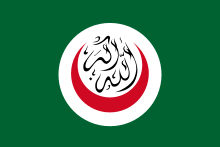
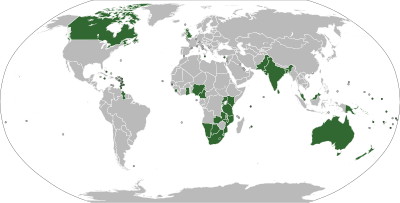

Other bodies

_(2).jpg)
- World Jewish Congress president Ronald S. Lauder said in a statement that "The World Jewish Congress is extremely concerned by the plight of the Rohingya minority in Myanmar, who has suffered widespread persecution for years under the ruling military government and has been forced to flee in the hundreds of thousands in the past two weeks alone. The divisive, anti-minority rhetoric heard around the world today has the potential to escalate into ethnic violence, ethnic cleansing, and genocide, signs of which are already strongly taking shape in Myanmar. The Jewish people, who are far too often targeted with violence and bigotry, must not remain silent in the face of such extremism, no matter where or how it rears its head. The World Jewish Congress urges the international community to safeguard the rights of all minority communities, including those threatened by sectarian violence and oppression".[167]
- United States Holocaust Museum released a statement saying it was "horrified by the ongoing attacks on Rohingya civilians in Rakhine State, western Burma, and calls on the Burmese government to immediately cease its military operations in the region. According to reports, this campaign includes the widespread and systematic targeting of Rohingya with killing, rape, torture, and forced displacement. The Museum reiterates its deep concern about these ongoing mass atrocities, including the risk of genocide".[168]
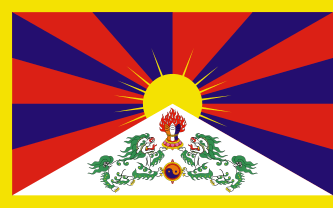
- A joint statement by 12 Nobel laureates and 15 prominent citizens demanded the United Nations Security Council urgently address the situation and make an intervention if necessary, with all available options.[170] The signatories included Muhammad Yunus, Betty Williams, Oscar Arias Sánchez, Shirin Ebadi, Tawakkol Karman, Archbishop Desmond Tutu, Jody Williams, Leymah Gbowee, Malala Yousafzai, Richard J. Roberts, Elizabeth Blackburn, Mairead Maguire, Syed Hamid Albar, Richard Branson, Mo Ibrahim, Alaa Murabit, Kasit Piromya, Paul Polman, Jeffrey D. Sachs, Jochen Zeitz, Emma Bonino, Gro Harlem Brundtland, Kerry Kennedy, Narayan Murthy, Surin Pitsuwan, Mary Robinson, Forest Whitaker, Shabana Azmi, Javed Akhtar and Asma Jahangir.[170] The open letter stated:
We call on UNSC to intervene immediately by using all available means. We request you to take immediate action for cessation of indiscriminate military attack on innocent civilians that is forcing them to leave their home and flee country to turn into stateless people. The arguments that the Myanmar government is using to deny Rohingyas their citizenship are ludicrous, to say the least. At independence of Burma from the British in 1948 and under successive governments, Burma recognized the people of all ethnicities within its border, including the Rohingyas, as full citizens, having representation in the parliament. The military juntas in the 1980s decided that Rohingyas are not Burmese. Accordingly, they stripped the Rohingyas of their citizenship. They used military and political means to make sure that the Rohingyas leave the country. Systematic persecution aiming at ethnic and religious cleansing began....A bold change in approach is needed by United Nations and the international community if there is to be an end to the cycle of violence against the Rohingyas. The government of Myanmar needs to be told that international support and finance is conditional on a major change in policy towards the Rohingya. Propaganda and incitement of hatred and all violence, particularly state violence against Rohingyas must stop, discriminatory laws and policies must go, the recommendations of Kofi Annan's commission must be implemented immediately.[171][172]
- Inter-Parliamentary Union adopted a resolution during its 137th Assembly in St. Petersburg stating "This resolution urges the global parliamentary community to take concrete steps to put an end to the ethnic cleansing of the Rohingya from Rakhine state, and to end further human rights violations...We cannot remain on the sidelines as one million people flee violence and persecution. This crisis is a major threat to regional peace and security". IPU Assembly President Valentina Matviyenko said "The resolution on the emergency item at this year’s Assembly was adopted by an overwhelming majority of the world’s parliamentarians, reflecting the concern of the entire global community over the situation". IPU Secretary General Martin Chungong said "The situation of the Rohingya is unacceptable. It is vital that parliamentarians from around the world stand together to condemn this atrocity".[173]
- Commonwealth Parliamentary Association released a statement during its 63rd General Assembly in Dhaka which called "for urgent action from the international community to resolve the ongoing humanitarian crisis facing the Rohingyas ethnic minority".[174]
See also
References
- 1 2 3 "The Rohingya refugee crisis is the worst in decades". The Economist. 21 September 2017. Retrieved 23 September 2017.
- ↑ Samuel Osborne (2017-03-14). "Burmese government may be trying to 'expel' all Rohingya Muslims, UN special rapporteur warns". The Independent. Retrieved 2017-09-13.
- ↑ "Report identifies mounting evidence of Rohingya genocide, blames Myanmar". Retrieved 3 October 2018.
- ↑ "Burma: Satellite Images Show Massive Fire Destruction | Human Rights Watch". Hrw.org. Retrieved 2017-09-13.
- ↑ Head, Jonathan (2017-09-08). "Rohingya crisis: Seeing through the official story in Myanmar - BBC News". Bbc.com. Retrieved 2017-09-13.
- ↑ Will Worley. "Burma: Rohingya children 'beheaded and burned alive' as refugees continue to flood into Bangladesh to escape violence". The Independent. Retrieved 2017-09-13.
- ↑ "Myanmar slaughter: Rohingya woman tells story of brutal rape in Rakhine - Correspondents Report - ABC Radio". Abc.net.au. 2017-09-02. Retrieved 2017-09-13.
- ↑ "Myanmar Army landmines along border with Bangladesh pose deadly threat to fleeing Rohingya | Amnesty International". amnesty.org. Retrieved 2017-09-14.
- ↑ "Dhaka claims 3,000 Rohingyas have been killed by Myanmar security forces". Dhaka Tribune. 2017-09-09. Retrieved 2017-09-13.
- ↑ Armangue, Bernat. "Myanmar military says death toll in clashes almost 400". The Washington Post. Retrieved 2017-09-13.
- 1 2 3 "ISCG Situation Report: Rohingya Refugee Crisis, Cox's Bazar - 14 January 2018 - Bangladesh". Retrieved 3 October 2018.
- ↑ "Ten thousand Rohingya likely killed in Myanmar violence, MSF says". 14 December 2017. Retrieved 3 October 2018.
- ↑ http://time.com/5128225/myanmar-rohingya-mass-graves-crisis/
- ↑ Lone, Wa; Oo, Kyaw Soe; Lewis, Simon; Slodkowski, Antoni. "Massacre in Myanmar: One grave for 10 Rohingya men". Reuters. Retrieved 3 October 2018.
- ↑ "Reporters held 'for investigating killings'". 8 February 2018. Retrieved 3 October 2018 – via www.bbc.com.
- ↑ "Amnesty Accuses Myanmar of Apartheid Against Rohingya". Time. Retrieved 3 October 2018.
- 1 2 Stephanie Nebehay and Simon Lewis. "U.N. brands Myanmar violence a 'textbook' example of ethnic cleansing". Reuters. Retrieved 2017-09-14.
- ↑ Penny Green; Thomas MacManus; Alicia de la Cour Venning (2015-11-02). "COUNTDOWN TO ANNIHILATION: GENOCIDE IN MYANMAR" (PDF). International State Crime Initiative. Retrieved 2017-09-14.
- ↑ "Myanmar General's Purge of Rohingya Lifts His Popular Support". Retrieved 3 October 2018.
- ↑ "Ministry of Foreign Affairs Press Release on Grave Human Rights Violations against Rohingya Muslims in Burma/Myanmar - Ministry of Foreign Affairs - Islamic Republic of Afghanistan". Mfa.gov.af. Retrieved 2017-09-13.
- ↑ "Violence in Burma: Algeria calls for "urgent protection" of Rohingya". Sudhorizons.dz. Retrieved 2017-09-13.
- ↑ Murdoch, Lindsay, "Australia slammed for refusing to back Rohingya investigation," March 15, 2017, Sydney Morning Herald in Newcastle Herald (Australia), retrieved September 26, 2017,
- ↑ "Australia pledges $5 million to Rohingya". Skynews.com.au. 2017-09-09. Retrieved 2017-09-13.
- ↑ "Rohingya in Australia hold protest to call for action over Myanmar violence," September 9, 2017, SBS News, retrieved September 26, 2017,
- ↑ "Rohingya asylum seeker claims he was pressured to accept cash from Australia to leave Manus," September 20, 2017, SBS News, retrieved September 26, 2017
- ↑ "Australia offers to pay Rohingya Muslims to return to Myanmar," September 21, 2017, News.com.au (News Corp Australia) retrieved September 25, 2017
- ↑ "Australia offers $25,000 to Rohingya refugees willing to return to Myanmar," September 19, 2017, South China Morning Post, retrieved September 26, 2017
- 1 2 3 4 5 6 7 Mike Ives (2016-12-09). "14 Countries Press Myanmar to Allow Aid in Rohingya Areas - The New York Times". Nytimes.com. Retrieved 2017-09-13.
- ↑ "Azerbaijan extends humanitarian aid to Rohingya Muslims". Azernews.az. 2017-09-08. Retrieved 2017-09-13.
- ↑ Star Online Report. "Bangladesh parliament resolve to push Myanmar to take back Rohingya refugees". The Daily Star. Retrieved 2017-09-13.
- ↑ "President Hamid discusses 'Rohingya safe zone' with Turkish President Erdogan". bdnews24.com. 2013-09-14. Retrieved 2017-09-13.
- ↑ Michael Safi in Delhi. "Bangladesh calls on Myanmar to take back Rohingya refugees | World news". The Guardian. Retrieved 2017-09-13.
- ↑ "Bangladesh minister speaks of 'genocide' in Myanmar's Rakhine". Channel NewsAsia. Retrieved 2017-09-13.
- ↑ "Bangladesh FM: Violence against Rohingya 'is genocide' | News". Al Jazeera. Retrieved 2017-09-13.
- ↑ "Dhaka protests as Myanmar helicopters violate Bangladesh airspace". bdnews24.com. 2017-09-01. Retrieved 2017-09-13.
- ↑ "'Befitting reply' if Myanmar creates anarchy in border: BGB chief". thedailystar.net. Retrieved 2017-09-14.
- ↑ "Yunus suggests 7-point proposal for resolving Rohingya crisis". The Daily Star. Retrieved 2017-09-14.
- ↑ "PM's Ukhiya visit draws rare praise from BNP". Dhaka Tribune. Retrieved 2017-09-14.
- ↑ "Ershad for slapping a sanction on Myanmar". The Daily Star. Retrieved 2017-09-14.
- ↑ "BAF jets, navy ships deployed near Myanmar border". Dhaka Tribune. Retrieved 2017-09-14.
- ↑ "Bangladesh for peaceful solution to Rohingya crisis". Dhaka Tribune. Retrieved 2017-09-14.
- ↑ France-Presse, Agence (22 September 2017). "Bangladesh's PM at UN urges 'safe zones' for Myanmar's Rohingya". Retrieved 5 October 2017 – via www.telegraph.co.uk.
- ↑ "Bangladesh PM wants Rohingya safe zones in Myanmar". www.aljazeera.com. Retrieved 5 October 2017.
- ↑ Associated Press (28 September 2017). "The Latest: Bangladesh urges UN act on violence in Myanmar". Archived from the original on 5 October 2017. Retrieved 5 October 2017 – via www.washingtonpost.com.
- ↑ "Don't shift focus from Myanmar's Rohingya crisis, Bangladesh tells UN Security Council - bdnews24.com". bdnews24.com. Retrieved 5 October 2017.
- ↑ "Minister Reynders calls for concrete measures in favor of Rohingyas in Myanmar". belgium.be. 20 September 2017. Retrieved 5 October 2017.
- ↑ http://www.daily-sun.com/printversion/details/286609/Brazil-ready-to-help-Bangladesh-resolve-Rohingya-crisis
- ↑ "Trudeau presses Suu Kyi on violence against Rohingyas". thedailystar.net. Retrieved 2017-09-14.
- ↑ "Canada faults Myanmar government for failing to end violence against Rohingya Muslims". The Globe and Mail. Retrieved 2017-09-14.
- ↑ [September 14, 2017 "Violence against Rohingya 'looks a lot like ethnic cleansing,' Freeland says,"], September 14, 2017 CBC. Canadian Broadcasting Corporation). Retrieved November 30, 2017
- 1 2 Ottawa, Agence France-Presse in (2018-09-20). "Canada accuses Myanmar of genocide against Rohingya". the Guardian. Retrieved 2018-09-21.
- ↑ Nations, Agence France-Presse at the United (24 December 2017). "China and Russia oppose UN resolution on Rohingya". the Guardian. Retrieved 3 October 2018.
- ↑ Editorial, Reuters. "China's Xi discusses Rohingya crisis with Myanmar army chief". Retrieved 3 October 2018.
- ↑ "Global split over Rohingya crisis as China backs Myanmar crackdown". Channel NewsAsia. Retrieved 2017-09-14.
- ↑ "China willing to help defuse Rohingya crisis, says foreign minister". Retrieved 3 October 2018.
- ↑ Lee, Yimou. "China draws three-stage path for Myanmar, Bangladesh to resolve..." Retrieved 3 October 2018.
- ↑ "Hong Kong protest to shed light on Rohingya plight". Retrieved 3 October 2018.
- ↑ "Denmark donates Tk 256m for Rohingya refugees". The Daily Star. Retrieved 2017-09-14.
- ↑ "Egypt condemns violence in Myanmar, demands protection of Rohingya Muslims-SIS". sis.gov.eg. Retrieved 2017-09-14.
- ↑ "French President labels attacks on Rohingya minority as 'genocide'". sbs.com.au. Retrieved 5 October 2017.
- ↑ "Myanmar/Burma – Situation of the Rohingya - France-Diplomatie - Ministère de l'Europe et des Affaires étrangères". diplomatie.gouv.fr. Retrieved 2017-09-14.
- ↑ Sun, The Daily. "Yunus urges French president to address Rohingya crisis - daily sun". Retrieved 3 October 2018.
- ↑ http://www.dhakatribune.com/bangladesh/foreign-affairs/2017/12/12/france-backs-bangladesh-rohingya-crisis/
- ↑ "Rohingyas a 'huge burden' for Bangladesh: Germany". bdnews24.com. Retrieved 2017-09-14.
- 1 2 3 "Resolving Rohingya Crisis: Europe stands by Bangladesh - The Nation". Retrieved 3 October 2018.
- ↑ "Pope Francis: appeal for end to violence against Rohingya - Vatican Radio". en.radiovaticana.va. Retrieved 2017-09-14.
- ↑ CNN, Joshua Berlinger and Delia Gallagher,. "Pope Francis: 'The presence of God today is also called Rohingya'". Retrieved 3 October 2018.
- ↑ Haidar, Suhasini (1 December 2017). "Such a strange silence: India's stand on the Rohingya crisis". Retrieved 3 October 2018 – via www.thehindu.com.
- ↑ "Modi's party stokes anti-Muslim violence in India: report". Retrieved 3 October 2018.
- ↑ "PM Modi tells Suu Kyi India is with Myanmar, but skips mention of Rohingya issue | india-news". Hindustan Times. Retrieved 2017-09-14.
- 1 2 "PM Narendra Modi advised Suu Kyi not to 'destroy' her image: Swaraj". Economic Times. Retrieved 2017-10-22.
- ↑ "Subscribe to read". ft.com. Retrieved 2017-09-14.
- ↑ "Rohingya are illegal immigrants who need to be deported, says Kiren Rijiju". The Hindu. Retrieved 2017-09-14.
- 1 2 3 "Varun Gandhi's View On Rohingya Draws Big Put-Down From Government" September 26, 2017, NDTV.com, retrieved September 26, 2017
- ↑ Gandhi, Varun, Editorial (in Hindi) September 26, 2017, in Navbharat Times, retrieved September 26, 2017
- ↑ "Rohingya refugees are common people, not terrorists, says Mamata Banerjee". intoday.in. Retrieved 5 October 2017.
- ↑ "Shashi Tharoor slams Rajnath Singh's excuse on Rohingyas: How to apply for refugee status when there is no mechanism?". Retrieved 3 October 2018.
- ↑ "Exclusive: Public Anger Brews in Bangladesh Over India's Stance on Rohingya Crisis". The Wire. Retrieved 2017-09-14.
- ↑ "India urges Myanmar to act with restraint,", September 10, 2017 ABC News, retrieved September 14, 2017
- ↑ "India voices concern". The Daily Star. Retrieved 2017-09-14.
- ↑ Staff, The Wire. "India Sends Relief Assistance for Rohingya Refugees in Bangladesh". thewire.in. Retrieved 5 October 2017.
- ↑ https://www.dhakatribune.com/bangladesh/foreign-affairs/2018/04/20/modi-say-rohingyas-returned-bangladesh/
- ↑ "The Latest: Indonesia sends 34 tons of aid for Rohingya". ABC News. Retrieved 2017-09-14.
- ↑ "Indonesian President Jokowi deplores violence against Rohingya". Channel NewsAsia. Retrieved 2017-09-14.
- ↑ Reuters Editorial. "Indonesia foreign minister flies to Bangladesh after Myanmar visit on Rohingya". Reuters. Retrieved 2017-09-14.
- ↑ Post, The Jakarta. "Jokowi visits Rohingya refugee camp in Cox's Bazar". Retrieved 3 October 2018.
- ↑ "The Latest: Indonesia sends 34 tons of aid for Rohingya". NY Daily News. Retrieved 2017-09-14.
- ↑ "Iran urges Myanmar to end violence against Rohingyas, allow access to humanitarian aid". firstpost.com. Retrieved 2017-09-14.
- ↑ "The Ministry of Foreign Affairs strongly condemns the heinous crimes committed by the Government of Myanmar against the Rohingya". mofa.gov.iq. Retrieved 5 October 2017.
- ↑ "Amid uproar, Israel halts arms sales to Myanmar — report". Retrieved 3 October 2018.
- ↑ "Rohingya: Italy deeply concerned, pledges 7 million Euros at Donors Conference in Geneva - OnuItalia". www.onuitalia.com. Retrieved 3 October 2018.
- ↑ "Emergency Grant Aid for the people in Myanmar and Bangladesh in response to the destabilized situation in the northern part of Rakhine State, Myanmar| Ministry of Foreign Affairs of Japan". mofa.go.jp. Retrieved 2017-10-02.
- ↑ "The Attacks in Northern Areas of Rakhine State in Myanmar and the Release of the Final Report by the Advisory Commission on Rakhine State (Statement by Foreign Press Secretary Norio Maruyama) | Ministry of Foreign Affairs of Japan". mofa.go.jp. Retrieved 2017-09-14.
- ↑ "Germany, Sweden, Japan to raise Rohingya issue at ASEM". 19 November 2017. Retrieved 3 October 2018.
- ↑ "Japan's foreign minister visits Myanmar Rohingya villages". Nikkei Asian Review. Retrieved 3 October 2018.
- ↑ "Jordan distributes 2nd batch of aid to Rohingya refugees". 20 November 2017. Retrieved 3 October 2018.
- ↑ "Rohingya tragedy 'unforgivable', Queen Rania says after visiting refugee camps". Retrieved 3 October 2018.
- ↑ "Korea to give $1.4m fund for Rohingyas". 29 December 2017. Retrieved 3 October 2018.
- ↑ "Kuwait specializes USD 1.5 mln for Rohingya - Myanmar". ReliefWeb. Retrieved 2017-09-14.
- ↑ http://burmacampaign.org.uk/denmark-and-latvia-support-un-burma-inquiry/
- ↑ "Bangladesh not alone in Rohingya crisis, says Najib". Free Malaysia Today. Retrieved 2017-09-14.
- ↑ Reuters Editorial. "Malaysian PM urges intervention to stop 'genocide' of Myanmar's Rohingya Muslims". Reuters. Retrieved 2017-09-14.
- ↑ "Malaysia warns Rohingya crisis could lead to Isil attacks in Burma". telegraph.co.uk. Retrieved 2017-09-14.
- 1 2 "Philippines accepts Malaysia's rejection of ASEAN statement". New Jersey Herald. NaN. Archived from the original on 28 September 2017. Check date values in:
|date=(help) - ↑ "Maldives severs trade ties with Myanmar - Maldives Independent". maldivesindependent.com. Retrieved 5 October 2017.
- ↑ Exteriores, Secretaría de Relaciones. "Mexico Expresses Concern over the Situation of the Rohingya Minority in Myanmar". gob.mx (in Spanish). Retrieved 2017-12-06.
- ↑ "Rohingya crisis: Suu Kyi says 'fake news helping terrorists'". BBC News. Retrieved 2017-09-14.
- ↑ "Aung San Suu Kyi lashes out at 'misinformation' from 'terrorists' as 126,000 Rohingya flee Burma". telegraph.co.uk. Retrieved 2017-09-14.
- ↑ Times, Global. "Morocco sends humanitarian aid to Rohingya refugees in Bangladesh - Global Times". www.globaltimes.cn. Retrieved 3 October 2018.
- ↑ "Netherlands pledges aid to Rohingya population". NL Times. Retrieved 2017-09-14.
- ↑ "Nigerian president likens Myanmar crisis to Bosnia, Rwanda genocides". 19 September 2017. Retrieved 5 October 2017 – via Reuters.
- ↑ "Nigeria urges end to 'ethnic cleansing' in Myanmar". aa.com.tr. Retrieved 2017-09-14.
- ↑ Affairs, Ministry of Foreign (19 September 2017). "Norway increases humanitarian support to Myanmar and Bangladesh". Government.no. Retrieved 28 September 2017.
- ↑ Siddiqui, Naveed (4 September 2017). "Khawaja Asif demands end to persecution of Rohingya Muslims". Dawn. Retrieved 26 September 2017.
- ↑ "Cabinet condemns Rohingya 'genocide'". Express Tribune. Retrieved 14 September 2017.
- ↑ Siddiqui, Naveed (9 September 2017). "Janjua summons Myanmar envoy to condemn violence against Rohingya Muslims". Dawn. Retrieved 26 September 2017.
- ↑ Constable, Pamela (12 September 2017). "The horror of the Rohingya crisis has enraged Pakistanis, sparking huge protests". Washington Post. Retrieved 26 September 2017.
- ↑ "Thousands in Pakistan protest 'genocide' of Rohingya Muslims". Dawn. 8 September 2017. Retrieved 26 September 2017.
- ↑ "Rohingya exodus into Bangladesh is no less than a disaster, says Mahmoud Abbas". Retrieved 3 October 2018.
- ↑ Esmaquel II, Paterno (18 May 2015). "PH open to sheltering 3,000 'boat people'". Rappler. Agence France-Presse. Retrieved 24 May 2015.
- ↑ Beh, Lih Yi; various, agencies (19 May 2015). "Philippines offers refuge to desperate migrants trapped on boats". Retrieved 31 May 2015.
“The Philippines has extended humanitarian assistance to ... ‘boat people’ and had even established a processing centre for Vietnamese travellers in the 70s”, said Herminio Coloma, a spokesman for the president, Benigno Aquino.
- ↑ Yap, DJ. "Duterte to Suu Kyi: Ignore human rights criticisms on Rohingya issue". Retrieved 3 October 2018.
- ↑ "Duterte cites 'genocide' in Myanmar, says PHL will take Rohingya refugees". Retrieved 3 October 2018.
- ↑ "Portugal calls for end to violence in Rakhine State of Myanmar - Xinhua - English.news.cn". news.xinhuanet.com. Retrieved 5 October 2017.
- ↑ "oc-media.org/russian-muslims-break-with-kremlin-over-myanmar/". oc-media.org. Retrieved 2017-09-14.
- ↑ "Chechen leader Ramzan Kadyrov at odds with Russia as he calls for protests over killings of Rohingya Muslims". telegraph.co.uk. Retrieved 2017-09-14.
- ↑ "Putin Condemns Myanmar Violence After Mass Rally in Chechnya". The Moscow Times. 5 September 2017.
- ↑ "Saudi Arabia condemns Myanmar's Rohingya attacks - Al Arabiya English". english.alarabiya.net. Retrieved 2017-09-14.
- ↑ News, EIN (20 September 2017). "Saudi Arabia Pledges $15 Million to Aid Rohingya Muslims in Myanmar". einnews.com. Retrieved 5 October 2017.
- ↑ "Singapore urges calm from all sides in Myanmar conflict, offers to work with Asean to provide humanitarian aid, Singapore News & Top Stories". The Straits Times. Retrieved 2017-09-14.
- ↑ "Singapore: Stop aggravating Rohingya crisis". The New Paper. 9 September 2017. Retrieved 28 September 2017.
- ↑ "Singapore pledges $100,000 in humanitarian aid to help in Myanmar's Rakhine crisis". The Straits Times. 19 October 2017. Retrieved 22 October 2017.
- ↑ News, United. "S Africa urges Myanmar to address Rohingya crisis". unb.com.bd. Retrieved 5 October 2017.
- 1 2 Reuters Editorial. "Sweden, Britain seek U.N. meeting on situation in Myanmar". Reuters. Retrieved 2017-09-14.
- ↑ "Switzerland to provide extra CHF12 million for displaced Rohingya". Retrieved 3 October 2018.
- ↑ http://www.dhakatribune.com/bangladesh/nation/2018/02/06/swiss-president-coxs-bazar-visit-rohingya-camp/
- ↑ "Turkish Envoy Visits Bangladesh to Help Rohingya Refugees from Myanmar". voanews.com. Retrieved 2017-09-14.
- ↑ "Rohingya refugee crisis: Turkish first lady visits Rohingya refugees". thedailystar.net. Retrieved 2017-09-14.
- ↑ Editorial, Reuters. "Turkish PM calls Rohingya killings in Myanmar 'genocide'". Retrieved 3 October 2018.
- ↑ "Statement by the delegation of Ukraine at the UNSC session on the situation in Myanmar". Permanent Mission of Ukraine to the United Nations. Retrieved 3 October 2018.
- ↑ "UAE donates Dh830,000 worth of aid to displaced Rohingya Muslims in Bangladesh". The National. Retrieved 2017-09-14.
- ↑ "UK calls for UN meeting on Myanmar violence | Myanmar News". Al Jazeera. Retrieved 2017-09-14.
- ↑ "Sweden, Britain seek UN meeting on situation in Myanmar". Channel NewsAsia. Retrieved 2017-09-14.
- ↑ "Foreign Secretary calls for an end to violence in Rakhine". GOV.UK. Retrieved 2017-09-14.
- ↑ "Rohingyas". daily-sun.com. Retrieved 2017-09-14.
- ↑ "Direct Cargo Flights from Dhaka: UK to lift ban shortly". 10 February 2018. Retrieved 3 October 2018.
- ↑ http://www.dhakatribune.com/bangladesh/foreign-affairs/2018/02/09/boris-johnson-rohingya-crisis-humanitarian-disaster/
- ↑ "British foreign secretary visits Cox's Bazar, learns about persecutions Rohingyas suffered in Myanmar". Retrieved 3 October 2018.
- ↑ "Trump says will be putting more sanctions on North Korea". 21 September 2017. Retrieved 5 October 2017 – via Reuters.
- ↑ Saine, Cindy. "US VP Condemns 'Terrible Savagery' Against Rohingya Muslims". voanews.com. Retrieved 5 October 2017.
- ↑ "Joint Statement on Humanitarian Access to northern part of Rakhine State | U.S. Embassy in Burma". mm.usembassy.gov. Retrieved 2017-09-14.
- ↑ "Bangladesh Hosting of Rohingya". state.gov. Retrieved 2017-09-14.
- ↑ "As Myanmar Muslims flee crackdown, US is wary of involvement". The Washington Post. Retrieved 2017-09-14.
- ↑ "US stops short of admonishing Myanmar". thedailystar.net. Retrieved 2017-09-14.
- ↑ "Trump Welcomes Najib Razak, the Malaysian Leader, as President, and Owner of a Fine Hotel". The New York Times. Retrieved 2017-09-14.
- ↑ Susan Ferrechio. "John McCain to punish Myanmar in defense bill". washingtonexaminer.com. Retrieved 2017-09-14.
- ↑ "State Dept. summoned Myanmar's ambassador on Rohingya - CNNPolitics". edition.cnn.com. Retrieved 2017-09-14.
- ↑ "US to provide $32 million in aid to Rohingya fleeing Myanmar". edition.cnn.com. Retrieved 2017-09-20.
Henshaw said Wednesday's announcement brought the total of US aid to Burmese refugees, including Rohingya, to nearly $95 million in fiscal year 2017.
- ↑ "US pressing Suu Kyi, Myanmar military over Rohingya crackdown: Haley". Retrieved 3 October 2018.
- ↑ "US envoy visits Cox's Bazar Rohingya camps". 18 April 2018. Retrieved 3 October 2018.
- ↑ "Uzbekistan calls on Myanmar to stop violence". aa.com.tr. Retrieved 5 October 2017.
- ↑ "UN chief calls on Myanmar to end Rohingya violence | Myanmar News". Al Jazeera. Retrieved 2017-09-14.
- ↑ "United Nations News Centre - Myanmar: UN rights chief says violence in Rakhine state 'predictable and preventable'". un.org. Retrieved 2017-09-14.
- ↑ "U.N. Human Rights Chief: Aung San Suu Kyi Could Be Culpable For Genocide". Retrieved 3 October 2018.
- ↑ "OIC condemns abuses against Rohingya in Myanmar". Arab News. Retrieved 2017-09-14.
- ↑ (http://www.hydrant.co.uk), Site designed and built by Hydrant. "Commonwealth Heads of Government Meeting Communiqué "Towards a Common Future" - The Commonwealth". thecommonwealth.org. Retrieved 3 October 2018.
- ↑ World Jewish Congress. "World Jewish Congress condemns Myanmar's persecution of Rohingya, urges international community to safeguard rights of all minorities :: World Jewish Congress". worldjewishcongress.org. Retrieved 2017-09-14.
- ↑ "Museum Statement on the Violence Against Burma's Rohingya Population — United States Holocaust Memorial Museum". ushmm.org. Retrieved 2017-09-14.
- ↑ "Dalai Lama says Buddha would have helped Rohingya". CNN. Retrieved 2017-09-14.
- 1 2 "Rohingya refugee crisis: Intervene now, take action to end crisis". thedailystar.net. Retrieved 2017-09-14.
- ↑ "Intervene now, take action". thedailystar.net. 14 September 2017. Retrieved 5 October 2017.
- ↑ "Yunus Centre". www.muhammadyunus.org. Retrieved 5 October 2017.
- ↑ "World MPs condemn the ethnic cleansing of the Rohingya minority in Myanmar". 17 October 2017. Retrieved 3 October 2018.
- ↑ Inc., Advanced Solutions International,. "Rohingya Statement Nov 2017". www.cpahq.org. Retrieved 3 October 2018.
